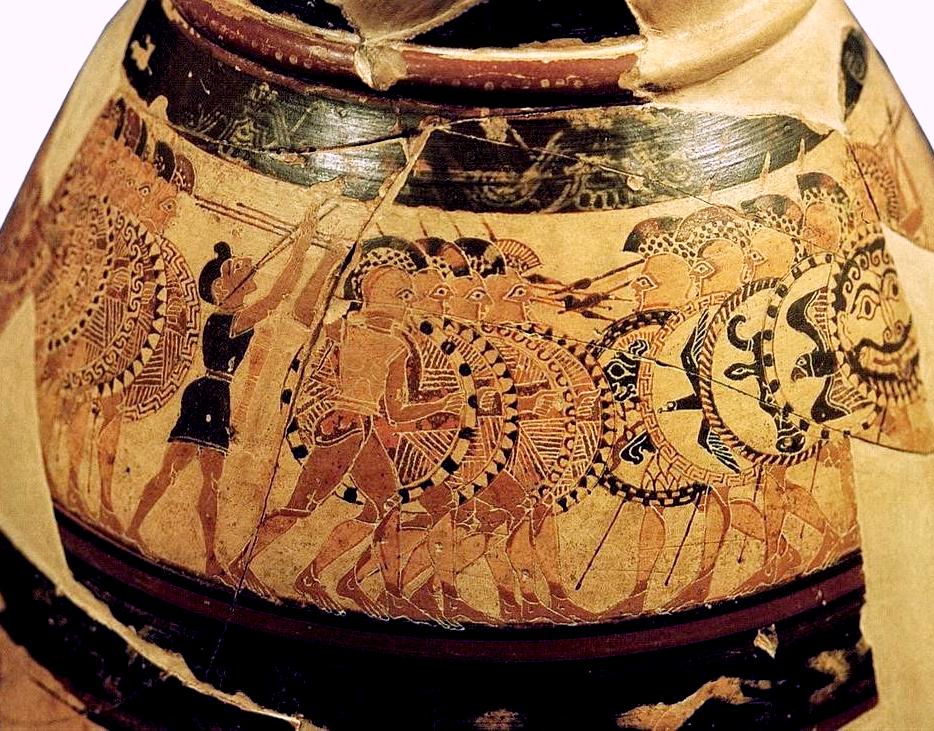
Ancient Greece: The Invention of Democracy

Figure 1.-- Ancient Greece stands out historically in many ways, including the arts, architecture, philosophy, and science. In all of these areas, however, it is a matter of degree. Other ancient socities all have imporessive achievements in these and other areas. There is one area in which Greece was absolutely unique. It invented the very idea of freedom--the dramatic birth at Marathon (490 BC). Greece also invented the related political system of democracy. No other ancient society and there are countless such socities at the time had come up with the idea of a democracy. But why the West? Why Greece? One contributing factor may have been the Greek way of waging war--the phalanx. This is a depection of hoplite warfare using the phalanx. It is from a Chigi vase in a pro-Corinthian style (7th century BC). Source: National Etruscan Museum, Rome.
|
|
Ancient Greece stands out historically in many ways, including the arts, architecture, philosophy, and science. In all of these areas, however, it is a matter of degree. Other ancient socities all have imporessive achievements in these and other areas. There is one area in which Greece was absolutely unique. It invented the very idea of freedom--the dramatic birth at Marathon (490 BC). Greece also invented the related political system of democracy. No other ancient society and there are countless such socities at the time had come up with the idea of a democracy. And this was not just the Mediterranean world, no society in Africa, Asia, Latin America, the Middle East, or Oceania conceived of democracy. It prioved to be a fragil concept. Democracy developed in the Greek city-state known as the polis (6th century BC). We know most about Athens, but most Greek city states had similar, but not identical systems. The result was the Greek Golden Age. It did not last long. It was swept away by Alexander the Great (4th century BC). Rome had a republic with democratic elements that lasted longer, but it was in Greece that democracy was invented and for a short time flourished. A question not often asked is why the West? Why Greece? And why only the West? It is an obvious question anf the fact it is not asked is curious. We suspect earlier that scholars just assumed the superiority of the West. Modern scholars to avoid any talk that suggests the superority of the West and more inclined to point out the definciences of classical society like slavery. But the question persists, why Greece and why only the West? Civilization had existed for millennia and spanded the major continents by the time the Greeks invented democracy. We do not pretend to have a definitive answer to this question. We do not see any glorious event that launched such a nobel enterprise. Nothing like the battle iof Mrathon which lsunched the idea of freedom or the stand of the colonial farmers who fired the 'shot heard around the world'. We do note two major developments that may have been important.
First there was a land-owning peasantry in Greece. In most ancients socities, the peasantry did not own the land or paid high fees/taxes to the ruling elite. Onership of land may have been due to the lucrative piracy that Greeks conducted in the opre-classical era. Some even believe that it was the Greeks that were the neferious sea people that that disrupted the Mediterranean world at the end of the Bronze Age. Greek piracy and then the even more lucratuve trading ecoinomy along with money led to a leveling of Greek society. The first coins appeared in neigbboring Lydia just as democracy began to devlop (about 700 BC).
Second there was the nature of the phalanx and hoplite warfare. It was a uniquely democratic type of warfare. There was nothing of the arustocratic warfare Homer writes about. There was no figure like Achilles engaged in dearing do. Rather there was a solid phalanx of shields and spears. Each man in the phalanx had to rely on the two men on either side of him for protection. His life was in the hands of the others -- essentially the very definition of democract. No one stood out. Every member of the phalanx was of equal importance. In no other abcient society was an individual of common social status so important.
HBC

Navigate the Historic Boys' Clothing Web Site:
[Return to the Main ancient Greek page]
[Return to the Main Greek chronology page]
[Introduction]
[Biographies]
[Chronology]
[Climatology]
[Clothing]
[Disease and Health]
[Economics]
[Geography]
[History]
[Human Nature]
[Law]
[Nationalism]
[Presidents]
[Religion]
[Royalty]
[Science]
[Social Class]
[Bibliographies]
[Contributions]
[FAQs]
[Glossaries]
[Images]
[Links]
[Registration]
[Tools]
[Children in History Home]
Created: 9:21 AM 9/29/20182
Last updated: 9:21 AM 9/29/2018



